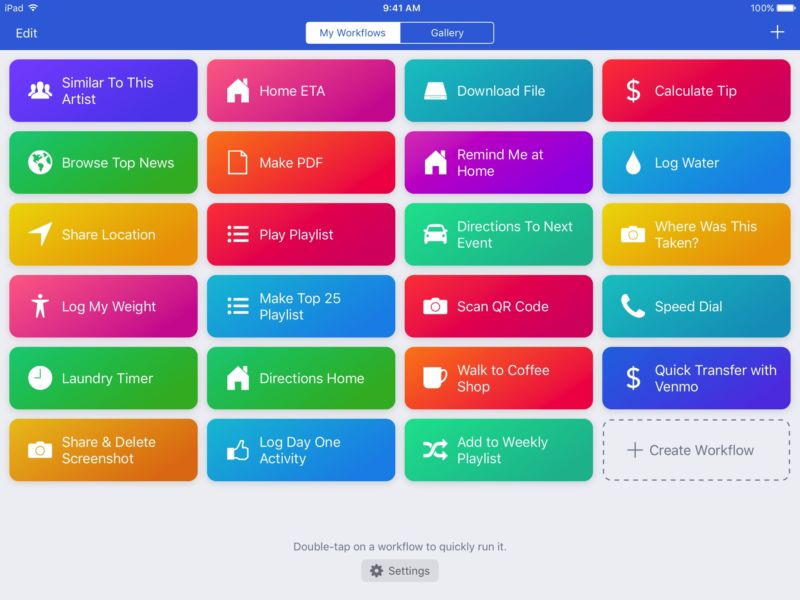
Late yesterday, Apple closed a deal to acquire Workflow, an app for iOS power users that lets you string a series of repetitive actions together to make them easier and quicker to accomplish. In many ways, the app accomplishes for iOS what the Automator app does for macOS. Late last year Apple laid off Sal Soghoian, the product manager in charge of automation-related products like Automator and AppleScript, and eliminated his position; the purchase of Workflow suggests that it could be the future of Apple's automation-related efforts.
Workflow's developers—Ari Weinstein, Conrad Kramer, Ayaka Nonaka, and Nick Frey—are all being hired by Apple, and they'll continue to develop Workflow which will continue to exist in the App Store. It used to cost $2.99, but it's now available to all users free of charge. The amount Apple paid for Workflow hasn't been disclosed, but TechCrunch reports that it was a "solid payday" for both the developers of the app and its investors.
Apple's statement about the acquisition highlighted that it had won an Apple Design Award in 2015 for its use of iOS' accessibility features, which suggests that the Workflow team could also help Apple develop and implement new accessibility features in future versions of iOS.
As hardware has gotten more powerful and iOS has become more flexible, Apple has started to push the iPad as a laptop replacement—it added some multitasking capabilities to iOS 9 but mostly left things untouched in iOS 10. The acquisition of Workflow, already a popular app among power users, may indicate a renewed focus on power user features in iOS 11. We'll find out more at WWDC in June, but I'd expect to see Workflow make an appearance onstage as Apple talks about new features. As a first-party app, it could also be used to showcase new APIs, and it may even be able to get deeper hooks into iOS than most third-party apps are allowed to.
It's hard to say how Apple's ownership will change the app otherwise, since Apple typically folds third-party tech into new or existing internally developed projects (TestFlight, a developer beta distribution app purchased back in 2014, is one counterexample). The Workflow 1.7.3 update released to coincide with the announcement strips out support for a handful of third-party app workflows and switches to Apple-designed or Apple-blessed services to provide some of its functionality. Apple Maps now provides all mapping functions, and the text translation workflow is now powered by Microsoft (much like Bing powers Siri and Spotlight searches). The team is also no longer accepting user-created workflows for the Workflow Directory.
Update: Marco Arment, developer of Overcast among other apps, has offered an explanation for the third-party app support that was removed in 1.7.3. Workflow offered third-party app developers a "simple one-page contract" to sign "confirming permission to use [their] URL schemes." Arment signed it, so Overcast remains supported in Workflow; the other third-party app developers presumably did not. They'll hopefully be able to change their minds if they want to sometime down the road.
Federico Viticci at MacStories probably has the biggest, most comprehensive archive of Workflow coverage out there, detailing the app's features in depth and sharing individual workflows that he finds useful. If you're interested in the app now that it's Apple-owned and free to download, that's where I'd tell you to start.
Listing image by fulcrumapp.com
reader comments
38